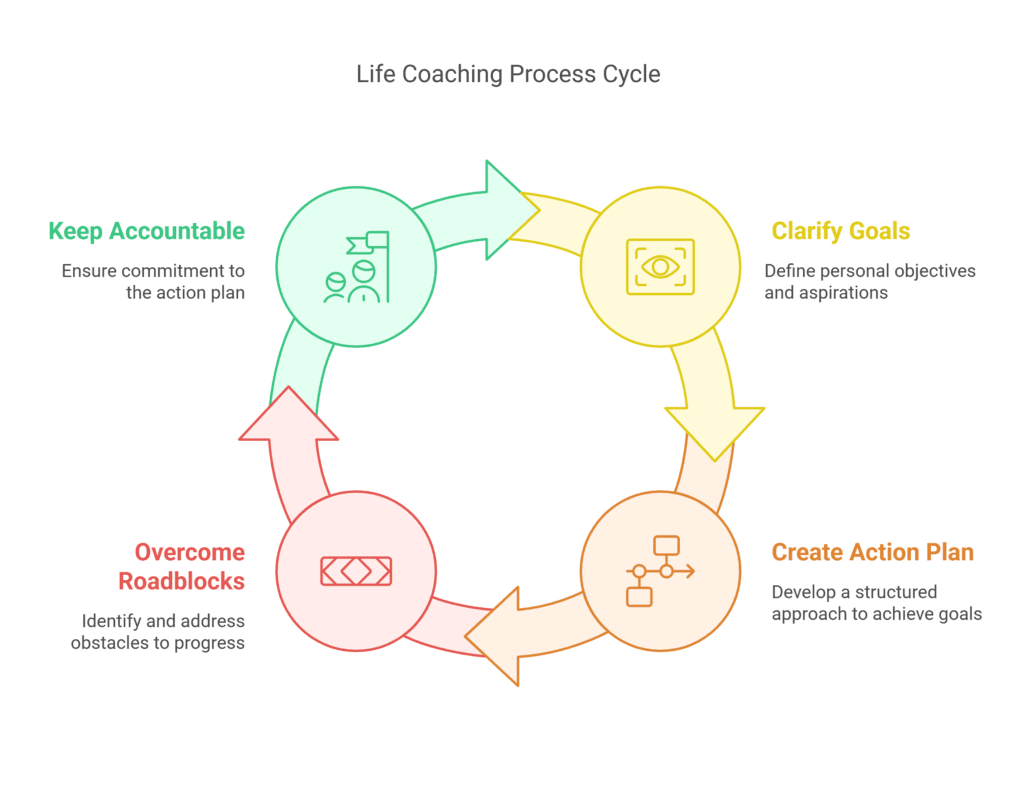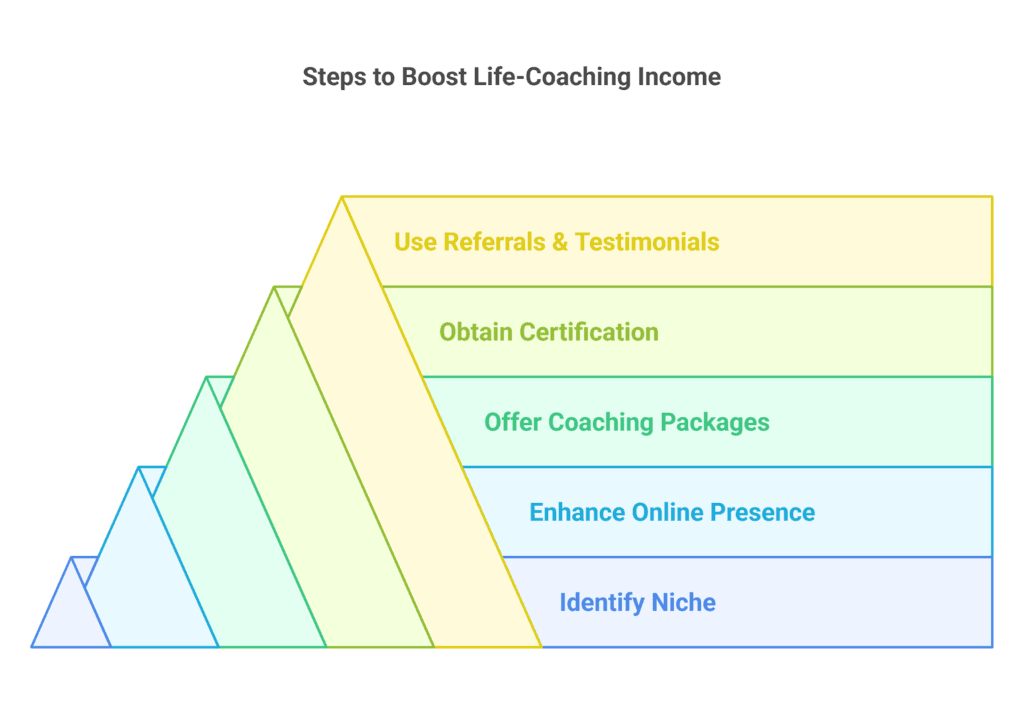Life coaching isn’t just a profession it’s a passion-driven career that helps people unlock their full potential. With personal growth becoming a priority for many, the demand for skilled life coaches is soaring. The industry is now worth billions, and many coaches earn over $60,000 a year some even reaching six figures, showing how powerful coaching income can be when aligned with impact and purpose.
But how much can you realistically earn as a life coach? What separates high-income coaches from those who struggle? And more importantly, how can you increase your earnings while making a real impact?
This guide breaks it all down. We’ll explore real numbers, key factors that affect your income, and proven strategies to grow your coaching business. Whether you’re just starting or looking to scale, you’ll find practical, actionable advice to help you build a thriving, profitable coaching career.
What is Life Coaching?
Life coaching is like having a personal guide who helps you reach your full potential. It’s a process where a coach works with you to clarify your goals, tackle challenges, and create a clear plan to achieve what matters most to you. Whether you’re looking to grow personally, advance in your career, or improve your health, a life coach is there to support you every step of the way.
Think of life coaching as a GPS for your life. Just as a GPS helps you find the best route to your destination, a life coach helps you chart a course for your goals, providing direction and encouragement when you hit roadblocks. And just like a good GPS, a good life coach helps you course-correct when things don’t go as planned.
Core Functions of Life Coaching
Life coaching is about helping you create real, lasting change. A good coach doesn’t give advice or make decisions for you they help you find clarity, stay accountable, and take meaningful action. Here’s how they do it:

Clarifying Your Goals
Ever feel stuck, unsure of what you really want? A life coach helps you cut through the noise and define clear, specific goals whether it’s improving your career, relationships, or personal growth. Without a clear target, progress is just guesswork.
Keeping You Accountable
How many times have you set a goal only to lose motivation a few weeks later? A coach acts as your accountability partner, making sure you stick to your commitments. When you know someone is checking in, it’s harder to make excuses and easier to stay on track.
Overcoming Roadblocks
Fear, doubt and procrastination are the silent killers of success. A life coach helps you recognize what’s holding you back and gives you strategies to push through. The biggest obstacle is rarely a lack of talent or opportunity it’s the mindset that keeps you from moving forward.
Creating an Action Plan
Big goals can feel overwhelming, but a coach helps break them down into smaller, manageable steps. Instead of feeling lost in the process, you get a clear roadmap that makes success feel within reach. Small, consistent actions lead to big results.
A life coach isn’t just someone who cheers you on they help you gain clarity, stay accountable, and move forward with confidence.
Types of Life Coaching
Different people have different needs, which is why life coaches often specialize in specific areas. Here are some common types of life coaching:

Personal Development Coaching
This type of coaching focuses on helping you become the best version of yourself. Maybe you want to boost your confidence, improve your relationships, or just feel more fulfilled. Personal development coaches help you grow in ways that are meaningful to you. For example, imagine you’ve always wanted to be more assertive in your life, but you’re not sure where to start. A personal development coach would work with you to develop practical strategies to build that confidence step by step.
Career Coaching
If you feel stuck in your job or unsure about your career path, career coaching could be a game changer. Career coaches guide you through finding the right job, preparing for interviews, or advancing in your current position. They help you discover what you’re truly passionate about and how to make that a reality in your professional life.
Health and Wellness Coaching
Health and wellness coaches focus on improving your overall well-being, both physically and mentally. Whether your goal is to lose weight, manage stress, or create healthier habits, these coaches provide support and structure to keep you on track. Picture someone trying to build a consistent workout routine but struggling to stay motivated. A health and wellness coach would offer personalized advice, encouragement, and strategies to keep them moving forward.
Business Coaching
For entrepreneurs and business owners, business coaching can be a key to success. Business coaches help you grow your business, improve leadership skills, and make smarter decisions. Whether it’s developing a business plan, managing a team, or increasing profits, a business coach brings clarity and focus to your work. Imagine a business owner feeling overwhelmed by the pressures of managing their company. A business coach would step in to help them prioritize tasks, delegate responsibilities, and focus on long-term growth.
How Much Do Life Coaches Earn on Average?

If you’re thinking about becoming a life coach or already are one, the big question on your mind might be, “How much does the average life coach make?” The answer depends on factors like your experience, niche, and location. But the great news is that life coaching can be a highly rewarding career, both personally and financially.
General Overview
When starting out, life coaches typically earn between $25,000 and $40,000 a year. While these early days are all about building your client base and gaining confidence, it’s also where you lay the foundation for future growth. So, how much does a life coach make a month? If you break it down, that’s roughly $2,000 to $3,500 per month.
With a few years of experience, life coaches can make anywhere from $50,000 to $75,000 annually. This is where most coaches find their stride, often specializing in a niche or developing a signature coaching style that attracts steady clients. By this stage, many coaches have the ability to earn around $4,000 to $6,000 a month.
At the top end, experienced coaches who have established a strong reputation and work with high-profile clients can earn $100,000 or more per year. Some even bring in $200,000 or higher, especially if they offer group coaching, workshops, or online programs. This can mean earning $8,000+ a month and often much more with successful marketing strategies.
Global Overview
The amount you earn as a life coach can also depend on where you live and work. For example:
- In the United States, coaches typically earn between $50,000 and $100,000 per year.
- In the UK, life coaches generally make around £30,000 to £60,000 annually.
- In Australia, annual earnings for life coaches range from AUD 50,000 to AUD 80,000.
Of course, these numbers can rise significantly if you specialize in executive coaching, business coaching, or other high-demand areas. Coaches in large cities or those working with corporate clients often charge more than those serving individuals.
Hourly Rates
Now, you might wonder, how much do life coaches make per session? Many life coaches charge by the hour, particularly when starting their practice. Here’s what you can expect:
- Entry-level coaches often charge between $50 to $150 per hour. This range allows new coaches to build their experience while still offering valuable guidance to clients.
- Experienced coaches typically charge $150 to $300 per hour, reflecting their expertise and the results they deliver.
- Top-tier coaches those who specialize in high-demand areas like business coaching can charge upwards of $500 per hour. These coaches often work with executives or companies looking for specific, results-driven strategies.
It’s common for life coaches to offer packages or long-term programs that provide a steady income. These options also make it easier for clients to commit to working with a coach for extended periods, leading to deeper transformation and better results. So, how much a life coach makes per hour depends on your experience, niche, and clientele but with the right approach, it can add up quickly.
Factors That Influence Life Coaching Income
When it comes to earning as a life coach, several factors can impact how much you make. Let’s dive into these factors to help you understand how to boost your earning potential as a coach.
Experience and Expertise
Your experience plays a big role in how much you can charge. The more experience you have, the higher your rates can be. Think of it like hiring a seasoned contractor – they can demand more because they’ve mastered their craft.
Niche Focus
Specializing in a specific area can boost your income. Coaches who focus on a particular niche, like career coaching or stress management, can charge more because their expertise meets a specific need.
Location and Market Demand
Where you are and the demand in your area affect your earnings. Life coaching in a busy city may bring in more clients than in a small town. The higher the demand, the better the pay.
Client Base
How many clients you have and their ability to pay influences your income. Coaches working with high-level professionals or businesses can typically charge more than those working with individuals in less lucrative industries.
Marketing and Reputation
Your ability to market yourself impacts your income. A strong online presence, word-of-mouth referrals, and a solid reputation can attract clients willing to pay premium rates.
So, building a successful life coaching business isn’t just about offering great advice – it’s about knowing your worth and positioning yourself in the right way.
How to Maximize Your Life-Coaching Income
Maximizing your life coaching income requires more than just offering great advice. It’s about positioning yourself strategically, attracting the right clients, and continuously growing your business to match your skills.

Find Your Niche
Focusing on a specific niche lets you stand out. Whether it’s leadership coaching or personal growth, a niche allows you to market yourself as an expert, making it easier to attract clients who are willing to pay more for specialized guidance.
Increase Your Online Presence
Having a strong online presence is essential. Use social media, a professional website, and client testimonials to show what you do. The more visible you are, the more people will know about your services and the better your chances of attracting high-paying clients.
Offer Packages, Not Just Sessions
Rather than charging for one-off sessions, offer coaching packages. Packages help clients commit long-term, and they bring in more money upfront. Plus, it allows you to build deeper relationships with your clients, which often leads to better results and more referrals.
Get Certified
While life coaching doesn’t require a degree, certifications can help you stand out and justify higher rates. It shows clients that you are committed to your craft and serious about helping them achieve their goals.
Leverage Referrals and Testimonials
Word of mouth is a powerful marketing tool. Ask happy clients for referrals and testimonials. A great review or recommendation can convince potential clients that you’re worth every penny.
Now, the key is to keep refining your approach, focusing on growth, and being open to opportunities that align with your skills. By doing so, you’ll unlock new income streams and boost your coaching business.
Life Coaching as a Full-Time vs. Part-Time Career
Deciding whether to pursue life coaching full-time or part-time comes down to your personal goals, lifestyle, and income expectations. Both paths have their benefits, but they also come with different challenges. Let’s break it down and see what fits best for you.

Part-Time Life Coaching
Starting part-time is like dipping your toes in the water before diving in. It lets you keep your current job or commitments while building your coaching practice at your own pace. You can work with a handful of clients, test your services, and figure out what works without the pressure of relying completely on your coaching income. However, going part-time may slow down your growth. It could take longer to build your client base and get to the financial level you want.
Full-Time Life Coaching
Going full-time means putting all your energy into coaching. You’re not just helping a few clients you’re building a business. Full-time coaching can lead to faster income growth, especially when you expand into group coaching, workshops, or online programs. But here’s the catch: it’s a bigger risk. If you don’t have enough clients or steady income yet, the transition can feel overwhelming. You’ll need a financial cushion and a solid plan to make sure your business doesn’t stall.
How to Transition from Part-Time to Full-Time Life Coaching
If you’re part-time now but dreaming of full-time success, the key is to grow your client base while staying consistent. Start by focusing on your niche and improving your online presence. As you build momentum, slowly increase your availability and look for ways to offer group coaching or other services that bring in extra income. The transition to full-time should be gradual. That way, when you leap, you’re ready for what’s ahead.
Whether you stay part-time or go full-time, success in life coaching comes down to your commitment to helping others and how well you build your business. Each path can lead to a fulfilling career, as long as you stay focused and keep improving. The choice is yours.
Conclusion
Becoming a life coach offers both personal fulfillment and financial rewards, but the path to success requires more than just passion. It’s about understanding the business side of coaching knowing your niche, effectively marketing yourself, and building a solid client base. Whether you choose to start part-time or dive in full-time, your growth will depend on how well you refine your skills and adapt to the needs of your clients.
The journey of life coaching is not just about earning money it’s about making a genuine impact on others’ lives while growing your own business. By staying focused on your goals, continuously learning, and adjusting your approach as you go, you’ll be well on your way to creating a thriving, fulfilling career that aligns with your vision.
Frequently Asked Questions About Life Coaching Income and Earnings
Q1: How much do life coaches earn on average?
The average income for life coaches ranges between $45,000 and $65,000 annually, but experienced coaches with strong niches can earn six figures. Earnings depend on location, specialization, marketing, and whether services are delivered online or in person.
Q2: How can a life coach increase their income?
Coaches boost income by specializing in high-demand niches, offering group coaching, creating online courses, and building strong personal brands. Effective marketing, networking, and using scalable digital products help maximize earnings while reducing reliance on one-on-one sessions.
Q3: What are the risks of becoming a life coach when it comes to income?
Risks include inconsistent client flow, reliance on referrals, and income instability in the early stages. Without strong marketing, many coaches struggle to generate consistent revenue. Building credibility, gaining certification, and diversifying offerings can reduce these risks.
Q4: How much does it cost to start a life coaching business?
Startup costs typically range from $3,000 to $8,000, covering certification programs, website development, marketing, and legal setup. Coaches who work online can minimize overhead, making life coaching a relatively affordable business to launch compared to other professions.
Q5: Is life coaching more profitable than other coaching careers?
Life coaching can be highly profitable, but fields like executive coaching often command higher fees due to corporate budgets. Life coaches may earn less per session, but can scale income faster through digital programs, group coaching, and broad market demand.





